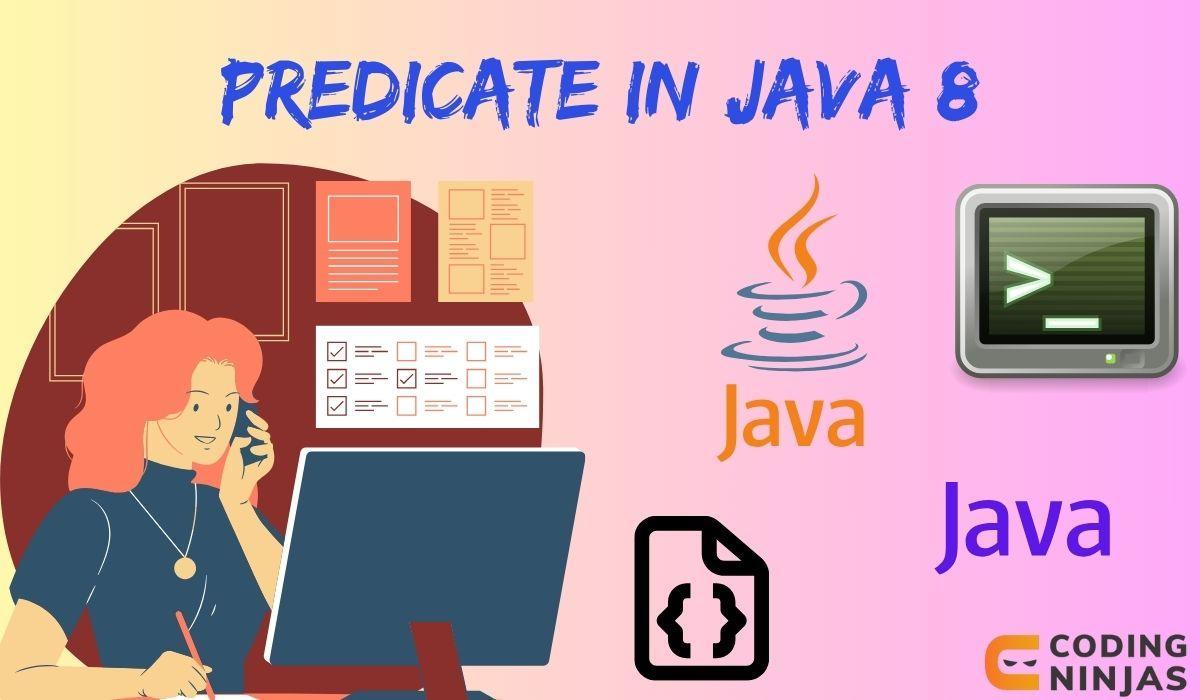When to Use Predicates?
Predicates in Java 8 are a boon for scenarios requiring conditional checks. These functional interfaces are often used in filtering operations or when you need to define a simple boolean condition. Think of predicates as a tool for deciding whether an object meets certain criteria. They're particularly useful in streams for concise and clear code. For example, when working with a list of objects, you might want to filter out those that don't meet specific conditions. Instead of writing lengthy conditional logic, you can neatly encapsulate the condition within a predicate. This not only makes your code more readable but also reusable. Predicates shine in scenarios like validating user input, processing collections, and implementing business logic where conditional checks are frequent.
Predicate Syntax in Java
The Predicate<T> interface in Java 8 is a functional interface, meaning it can be used as the assignment target for a lambda expression or a method reference. Its primary abstract method is test(T t), which evaluates the predicate on the given argument. The syntax is quite straightforward:
Predicate<Type> predicateName = (argument) -> expression;
Here, Type is the type of the input to the predicate, and expression is a boolean expression that defines the condition. The lambda expression (argument) -> expression succinctly implements the test method.
Characteristics of Predicate in Java 8
- Functional Interface: Predicate is a functional interface with a single abstract method test(T t) that returns a boolean.
- Part of java.util.function Package: It was introduced in Java 8 and belongs to the java.util.function package.
- Used for Conditional Checks: It is primarily used to test conditions and return true or false.
- Supports Lambda Expressions: Can be easily implemented using lambda expressions, making code cleaner and more readable.
- Method Chaining: Supports default methods like and(), or(), and negate() to combine multiple predicates logically.
- Commonly Used with Streams: Widely used in filtering operations in Java 8 Streams API with methods like filter().
- Generic Interface: Predicate is generic, so it can be used with any type (Predicate<T>), increasing its flexibility.
- Improves Code Reusability: Helps separate condition logic, allowing better reuse and cleaner functional code.
Java Predicate Interface Methods
The Predicate interface in Java 8 is not limited to the test method alone. It includes several default and static methods that enhance its functionality and provide more flexibility:
and( Predicate other )
This default method allows chaining of another predicate to form a compound statement. It's akin to a logical AND operation. If both predicates evaluate to true, the compound predicate returns true.
Predicate<String> nonEmptyStringPredicate = (String s) -> !s.isEmpty();
Predicate<String> longStringPredicate = (String s) -> s.length() > 10;
Predicate<String> compoundPredicate = nonEmptyStringPredicate.and(longStringPredicate);
or( Predicate other )
Similar to and, this method performs a logical OR operation. If either of the predicates returns true, the compound predicate evaluates to true.
// Using the previously defined predicates
Predicate<String> compoundOrPredicate = nonEmptyStringPredicate.or(longStringPredicate);
negate()
This default method inverts the logic of the predicate. If the predicate returns true, negate() will return false, and vice versa.
Predicate<String> negatePredicate = nonEmptyStringPredicate.negate();
isEqual( Object targetRef )
This static method returns a predicate that tests whether the object reference being tested is equal to the target reference, based on the equals method.
Predicate<Object> equalsPredicate = Predicate.isEqual("SomeString");
These additional methods make the Predicate interface a powerful tool for creating complex logical expressions in a clean and readable manner.
Java Predicate Interface Examples
To see predicates in action, let's dive into some code examples that illustrate their power and versatility in Java 8.
Basic Predicate Example
Here's a simple example of using a predicate to check if a number is greater than 5:
Predicate<Integer> greaterThanFive = (number) -> number > 5;
System.out.println(greaterThanFive.test(10)); // Output: true
System.out.println(greaterThanFive.test(3)); // Output: false
Combining Predicates
We can combine multiple predicates using default methods like and, or, and negate:
Predicate<String> startsWithA = (str) -> str.startsWith("A");
Predicate<String> endsWithX = (str) -> str.endsWith("X");
// Combining predicates
Predicate<String> startsWithAAndEndsWithX = startsWithA.and(endsWithX);
System.out.println(startsWithAAndEndsWithX.test("AX")); // Output: true
System.out.println(startsWithAAndEndsWithX.test("AB")); // Output: false
Using Predicates with Streams
Predicates are often used with Streams for operations like filtering:
List<String> names = Arrays.asList("Alice", "Bob", "Charlie", "David");
names.stream()
.filter((name) -> name.startsWith("A"))
.forEach(System.out::println); // Output: Alice
Predicate as Method References
If you have a method that matches the predicate's signature, you can use a method reference:
class StringUtil {
static boolean isUpperCase(String s) {
return s.equals(s.toUpperCase());
}
}
List<String> strings = Arrays.asList("abc", "ABC", "Abc");
strings.stream()
.filter(StringUtil::isUpperCase)
.forEach(System.out::println); // Output: ABC
These examples demonstrate the practicality and elegance of predicates in Java 8, making your code more concise and expressive.
Writing Clean Predicates in Java
Creating clean and maintainable predicates is key to enhancing the readability and efficiency of your code. Here are some tips to achieve this:
Use Descriptive Names
Choose predicate names that clearly describe their purpose. For instance, isValidEmail is more descriptive than testEmail.
Predicate<String> isValidEmail = (email) -> email.contains("@") && email.endsWith(".com");
Avoid Complex Lambda Expressions
If your lambda expression becomes too complex, consider refactoring it into a separate method. This improves readability and makes your code easier to test and debug.
Predicate<String> hasValidLength = (str) -> {
int length = str.length();
return length > 8 && length < 20;
};
Compose Predicates for Clarity
Instead of writing lengthy and complex predicates, break them down into simpler ones and combine them using methods like and, or, and negate.
Predicate<String> isNotEmpty = (str) -> !str.isEmpty();
Predicate<String> containsDigit = (str) -> str.matches(".*\\d.*");
Predicate<String> isValidPassword = isNotEmpty.and(containsDigit);
Use Static Import for Readability
Static importing the Predicate interface methods can make your predicates look cleaner and more readable.
import static java.util.function.Predicate.isEqual;
Predicate<String> isHello = isEqual("Hello");
Reuse Predicates
Identify common predicate patterns in your code and extract them as reusable components. This not only reduces code duplication but also enhances maintainability.
public static final Predicate<String> NOT_BLANK_STRING = (str) -> str != null && !str.trim().isEmpty();
By following these practices, you can write predicates that are not only functional but also clear and maintainable, making your Java code stand out.
Frequently Asked Questions
What is a predicate method?
A predicate method evaluates a condition and returns a boolean result. In Java, it’s defined by the test(T t) method of the Predicate interface.
Why do we need predicates in Java?
We need predicates in Java to write cleaner, reusable, and functional-style code, especially for filtering and conditional logic using lambda expressions and streams.
Can predicates be used with any type of object?
Yes, predicates in Java are generic and can be used with any type of object. They are defined as Predicate<T>, where T is the type of the input to the predicate.
How do predicates enhance code readability?
Predicates encapsulate conditional logic, making the code more concise and readable. They replace verbose conditional statements, leading to cleaner code.
Is it possible to combine multiple predicates?
Absolutely, predicates can be combined using methods like and, or, and negate, allowing for complex logical expressions in a clean and readable manner.
What is the difference between function and predicate in Java?
In Java, a Function is a functional interface that takes one argument and returns a result, while a Predicate is a functional interface that takes one argument and returns a boolean value, typically used for filtering or conditions.
Conclusion
Predicates in Java 8 are a powerful feature that significantly enhances the language's functional programming capabilities. They allow for writing concise, readable, and reusable conditional logic. Understanding and effectively using predicates, especially in stream processing, can lead to cleaner and more efficient Java code. The ability to combine predicates and the use of descriptive names further improve code clarity and maintainability. As a college student venturing into the world of Java programming, mastering predicates will undoubtedly add a valuable tool to your coding arsenal.
Recommended Readings:






